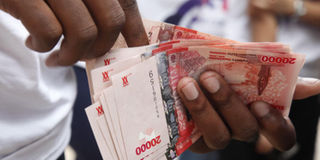Women entrepreneurs demand specific financing options

What you need to know:
Cash-strapped Kenyans are using household goods, livestock and office equipment to borrow from commercial banks in the four months that followed the phased reopening of the economy in July when individuals and businesses were starved of credit.
Ugandan women entrepreneurs want a dedicated credit line to access affordable funding from for their businesses.
Already, there are some funding initiative set up by the government such as the Uganda Women Entrepreneurship Programme , a scheme aimed at improving access to financial services for women and the Uganda Development Bank, the country’s development finance institution providing financial interventions across key economic sectors such as agriculture, human capital development, infrastructure and tourism and hospitality industries.
However, in a Women Entrepreneurs Policy Makers Engagement organised last week in Kampala by SEATINI Uganda, Women Rights Initiative and Uganda Small Scale Industries Association under the theme: “Rebuilding Resilient Women Entrepreneurs through gender responsive post Covid-19 economic stimulus packages” that the terms and conditions for many of the funding programmes for women are difficult.
As a result, the progress of many women entrepreneurs is limited, given that many of whom have no access to collateral such as land while others struggle to raise sufficient capital. Often times the test for them to prove themselves as genuine business women seems stiffer.
“Many financing and grants for women come with conditions that don’t consider the context under which several women businesses, majority of which operate in the micro, small and medium enterprise sector,” says the proprietor of D&M International, Ms Dorothy Kimuli at the meeting.
The processor of Chili Sauce and Tomato Ketchup, continued: “I was once asked whether I make a turnover of Shs100million or more as a condition to qualify for funding. I was shocked!”
As for Ednah Karamagi, the processor of avocado oil and some dairy products such as yogurt, funding for women entrepreneurs has, in several cases, priced out potential beneficiaries instead of widening the opportunities.
Central Bank of Kenya (CBK) data shows that a third of new loans of KSh84.6 billion issued by commercial banks between July and October used household goods, live animals and office equipment as collateral.
Goods
Cash-strapped Kenyans are using household goods, livestock and office equipment to borrow from commercial banks in the four months that followed the phased reopening of the economy in July when individuals and businesses were starved of credit.




